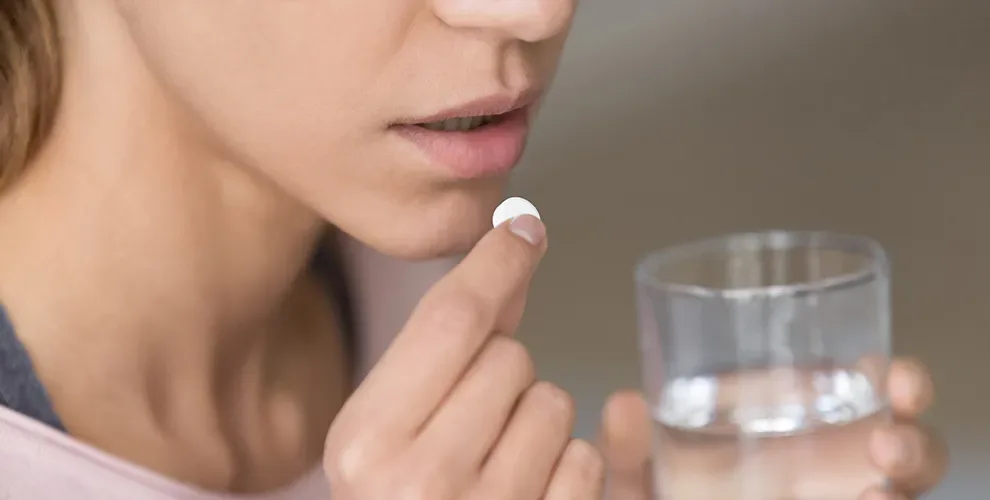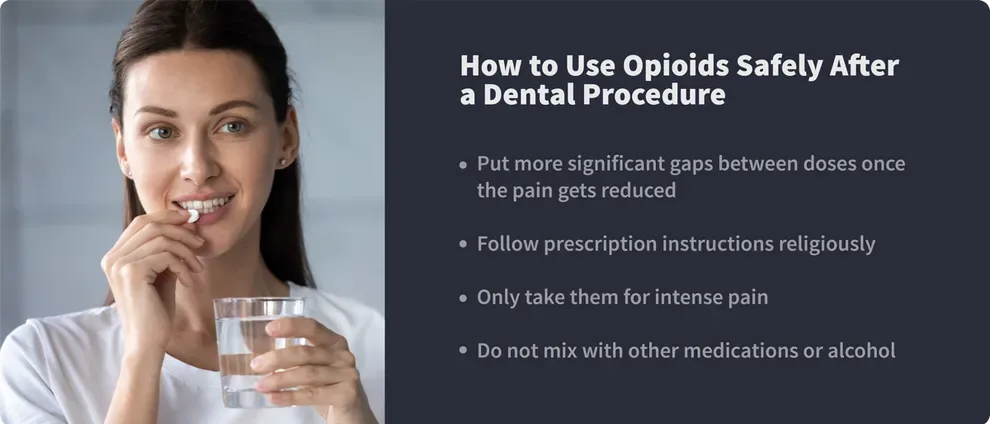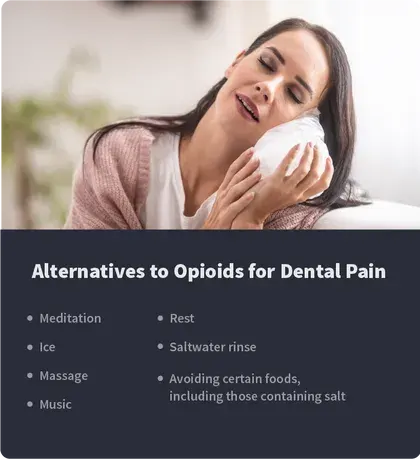Avoiding Opioids & Addiction After a Dental Procedure

Table of Contents
- Why Are Opioids Prescribed After Dental Procedures?
- Which Procedures?
- How Addictive Are Opioids?
- Dangers of Not Following Instructions
- Weaning Off
- Alternatives to Opioids
- Resources for Help
It’s common to be prescribed painkillers after a dental procedure. While opioids are effective at pain relief, they are prone to abuse.
Avoid opioid misuse issues, including addiction, by following safe use practices and employing other methods to manage pain following a dental procedure.
It’s not a news flash that we associate serious dental problems and oral surgeries with pain. Teeth and gums have numerous nerve endings. Tooth decay, mouth injuries and other significant issues tend to create sharp pain, dull aches, or something in between to let us know something’s wrong.
Dentists, like doctors, consider it good for business when patients aren’t in pain. So, it’s not surprising that they prescribe pain medication before and after dental procedures, such as root canals and wisdom teeth extractions.
But as with other physicians, dentists and oral surgeons are aware of the addiction dangers that accompany the use of a specific painkiller: opioids. Following a surge of opioid overdose deaths over the past decade, medical professionals now lean toward prescribing non-opioid painkillers to patients.
Life expectancy in the United States has dropped since 2016 largely because of an opioid crisis that continues to show worsening mortality rates.
Why Are Opioids Prescribed After Dental Procedures?
Pain is normal after dental treatment, and the goal of any dentist is to get pain to manageable levels. For most procedures, a mild painkiller will do the trick.
However, some dental procedures result in severe postoperative pain and dental emergencies that require radical numbing action. Additionally, some patients may undergo acute oral-facial pain that needs potent pain relief. In such situations, dentists will prescribe opioid-based painkillers because of their powerful pain-relieving abilities.
While opioid-based painkillers may be helpful and safe for some individuals, these medications present a high level of danger to many others, including those who struggle with substance use or are simply unaware of the risks of opioid addiction.
A 2021 University of Michigan study found that overdose rates were over two times higher for patients who filled an opioid painkiller prescription after a dental procedure versus those who didn’t fill such a prescription. Overdose rates were also higher among the family members of the patient who filled the opioid prescription, possibly because the opioid pills were stolen or misused.
Which Procedures Are Opioids Prescribed For?
Dentists have historically been the largest providers of opioid medications for younger people, often handing out prescriptions after the following procedures:
Third molar extractions
Gum surgery
Dental implant placements
Other dental surgeries or dental pain
How Addictive Are Opioids?
Opioids are highly addictive because they target the pleasure centers in your brain. This leads to the release of endorphins, a group of hormones that activate the brain’s reward centers.
While this is great for eliminating pain, it also creates a feeling of elation and pleasure, unlocking a temporary sense of well-being. Understandably, you will crave that same feeling when the dose wears off.With repeated uncontrollable use, you will soon have an addiction that causes an uncontrollable urge to take the drug, even when it harms you.The NHS indicates that in 2020, more than 10 million people misused their opioid prescriptions, and a further 1.6 million people had an opioid use disorder.According to the National Institute of Drug Abuse (NIDA), close to 50,000 people died of opioid overdose in 2019.
The Dangers of not Following Prescription Instructions

Failing to follow a dentist’s instructions regarding opioid use can lead to opioid addiction or even death. Opioids have tantalizing and euphoric effects that lure someone into abusing the prescribed amounts, leading to addiction.
Addiction can tempt someone into continual opioid use, leading to overdoses that often result in death. Data by NIDA indicates that over 14,000 people died of prescription opioid overdose in 2019.
Here’s how to use opioids safely:
Take fewer doses once your pain stabilizes.
Follow prescription instructions religiously.
Only use the opioids for intense pain.
Do not mix opioids with other medications or alcohol.
Weaning Off Opioids
If you’ve taken opioids for less than two weeks and stuck to the prescription recommended by your doctor, you should be able to stop using them immediately.On the other hand, if you went over your dosage or kept using the opioids for more than two weeks, you need to consult your doctor before stopping use cold turkey. This is especially true if you start displaying addiction symptoms, such as reduced effects from the prescribed dosage (tolerance).If you are dependent on opioids, suddenly stopping use may lead to withdrawal symptoms that can be dangerous. Consult your doctor to design a tapering withdrawal plan to reduce your opioid intake safely.The process is challenging and may take weeks or months, but you will be successful if you follow the doctor’s instructions.
Alternatives to Opioids

The CDC recommends non-opioid analgesics as the first option (first-line therapy) for managing pain from a dental procedure. In cases where dentists anticipate pain after an operation, the CDC recommends prescribing acetaminophen and non-steroidal anti-inflammatory drugs (NSAIDs).Alternatively, you can use nonmedicinal means to supplement the pain medication. Approaches include the following:
Meditation
Ice
Massage
Rest
Saltwater rinses
Avoiding certain foods, including those containing salt
A 2017 study of 14 dental clinics at the University of Michigan reported that of the dental patients who were prescribed painkillers after surgery, those who used opioids reported higher levels of pain than those who took non-opioid pain relievers.If a patient must use opioids, dentists should prescribe the lowest dosage of immediate-release opioids.The CDC also points out that most patients should feel the pain wear off after three days, so the desired dose should be three days or less. In very rare instances, opioids may be prescribed beyond three days, but they should never be prescribed for more than seven days for dental procedures.
Resources for Help
There are a number of free community, nonprofit, and government resources to help people who abuse opioids as well as their families. These federal organizations can provide a significant amount of information:
Centers for Disease Control and Prevention (CDC): The Drug Overdose section on the CDC’s website is a great resource for the latest information and data about drugs and drug use (and abuse) in the United States.
Substance Abuse and Mental Health Services Administration (SAMHSA): SAMHSA has a national helpline that is confidential, free, and open every hour of every day. You can get referrals to local resources, support groups, treatment programs, and other community-based help groups. You can also order free literature.
National Institute on Drug Abuse (NIDA): Among other things, NIDA is a trusted source for science-based information about drug use.
Other resources include the following:
Opioid addiction treatment programs: You can find a certified treatment program near you (or one that your insurance may cover) through the HHS treatment index here.
Narcotics Anonymous (NA): NA is most often associated with drugs like marijuana, cocaine, heroin, and methamphetamine, but many people who abuse prescription opioids turn to NA for help. You can start to find a 12-step drug abuse program on the NA website.
Virtual help: Narcotics Anonymous also provides virtual meetings around the globe. There is virtually no day or time when there is not a meeting available. Find a virtual NA meeting here.
